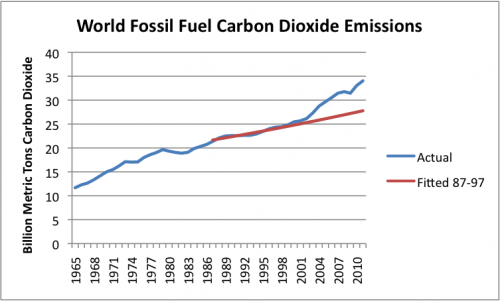Brought to you by Peet's Coffee...
We emerge now from the world of the Very Small, the quantum field and the Copenhagen Interpretation of Ben Bernanke's mad experiment in money printing, up into the macro-world where conventional reality takes place. Naturally, up here things are less interesting. Up here, we fight vainly the old ennui.
Ben Bernanke has been printing money for four years. His experiments are variations of what he calls "quantitative easing," which is an odd term. It sounds like an obese man loosening his belt after a huge meal. Euphemism, however, is critical in the field of fiat money. It's all made up and it won't do to call things by logical names. Indeed, one odd thing that has happened to my thinking over the last four years, and perhaps it has happened to yours, is that I now reflect on just what we mean by this term "money." As the Shorty character (played by Danny DeVito) says in "Get Shorty," money is very important. "That's why they call it money."
It's not a good thing when people start thinking about what money is in a fiat currency system. It's not helpful. That's why the trillion dollar coin idea went nowhere. It's as if we said, okay, we make it up, but we can't make it up that much.
The thermodynamics of Bernanke's experiment are built on the assumption that extra energy can be added for free to the monetary system, in the form of counterfeiting, and then extracted from the system at the point where the free energy introduced into the system threatens to blow the machine apart in a process called "hyperinflation," or super-debasement of the currency. Thus, it is not quite a perpetual motion machine, and the thermodynamic analysis, while cute, isn't going to allow itself to be carried off completely, to the consternation of your Pond Dweller. Nevertheless, the valiant effort was worth a shot, and it's a catchy blog post title, IISSM (if I say so myself - don't know if that one's in circulation).
I digress. Returning to the Federal Reserve's H.4.1, discussed last time, we note a few important numbers. http://www.federalreserve.gov/releases/h41/current/h41.htm#h41tab9. First, we can see that the actual currency in circulation at the present time isn't all that much. It's about $1.1 trillion (rounding off all numbers in this analysis). The Fed's balance sheet (its monetary base) has hypertrophied through the various iterations of Bernanke's Experiments (QE 1, QE2, Operation Twist, and now QE4-evah) to right around $3.1 trillion. This has occurred through the central bank's "purchases" of Treasuries and various forms of federally-insured housing debt (mortgage-backed securities [MBS] and Fannie/Freddie/FHA agency debt). The Fed bought all this stuff mostly from "Primary Dealers," the insider group of banks and financial institutions (domestic and foreign) that are the main beneficiaries of Fed money printing. The purchases are noted as the "Reserve" account down at the bottom of the H.4.1, currently around $1.7 trillion. At present the Fed is buying $4 billion every working day ($85 billion per month, or $1 trillion per year) and pumping this additional baksheesh into the gaping maw of the U.S. financial monster, already bloated on aerated money. Thus, at the end of this year, the Fed's balance sheet will stand at about $4 trillion and the "excess reserves" of the financial community will clock in at around $2.7 trillion.
The "excess reserves" held by the PDs sit quietly as a computer entry on the Fed's books. To encourage the banks to keep the money there, the Fed pays one quarter of one percent (.25%) interest on these accounts. In theory, the $2.7 trillion in "excess reserves" can be withdrawn by the financial institutions which own them; that's why they're called "excess." What would happen if all this money were withdrawn in a year and spent into the general economy? Well, suddenly the currency in circulation would increase rather dramatically, wouldn't it? From $1.1 trillion to about $3.8 trillion. Suddenly, almost four times as much currency would be chasing roughly the same amount of goods and services in the economy.
The Fed has a solution for that, of course. Bernanke believes he has a solution for everything, which is why he's an academic. His ideas only have to work in theory, and must pass muster with the Amen Chorus of Paul Krugman, Brad DeLong, Mark Thoma, Dean Baker and the other Cosmic Free Lunchers. In the event that inflation picked up beyond the 2% "target range," began to get out of hand, in other words, The Bernank would throw the Machine into reverse. All of those Treasuries and MBS holdings? Bernanke would begin selling them into the general economy and absorb all of the excess money, bringing it back to the Fed where it could be effectively "killed." The money injections would have served their salutary purpose of "pump priming," of creating the "wealth effect" that gets the economy moving again, gets people back to work, and the American Booboisie would go back to limitless Planning (parties) and Tanning, just like God wants them to.
It's the perfect crime. Counterfeiting which does no harm and in fact restores the country to economic health. Isn't it? We must once again depart on a cliff-hanger note. It seems apt for a Saturday morning. Little Nell (the American economy) is tied to the railroad tracks, Simon Legree (hyperinflation), is nyah-nyah-nyahing while stroking his long black mustaches, the train is bearing down, and Ben Bernanke, looking not a whole lot like Sergeant Preston of the Yukon, is riding to the rescue. I may be conflating a bunch of cartoons with a bunch of comic books. But you get the idea. Will he arrive in time? Tune in next time and see.
The video embedded below, along with the draft script and supporting links,
can be freely viewed on the Nature Bats Last Substack account. Comments are
ena...
5 days ago


